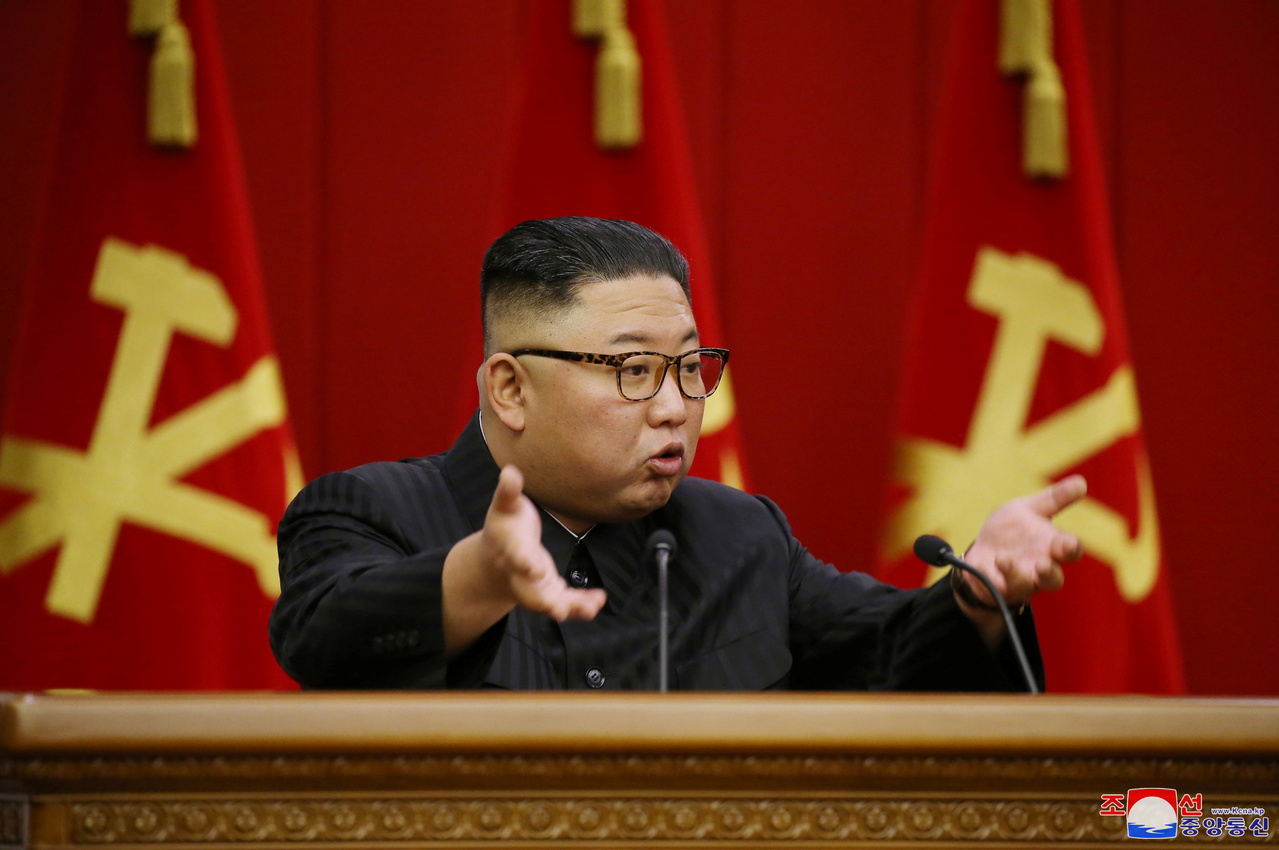North Korea's Kim Jong Un says 'grave crisis' caused by Covid-19 quarantine lapse
Sign up now: Get ST's newsletters delivered to your inbox

North Korean leader Kim Jong Un in Pyongyang on June 18, 2021.
PHOTO: REUTERS/KCNA
Follow topic:
SEOUL (BLOOMBERG, REUTERS) - North Korean leader Kim Jong Un said a "grave" situation stemming from quarantine negligence has created a crisis, hinting at Covid risks that could affect his rule after his regime has denied it has had any infections.
There were no details of the nature of the incident in the report from the state's official Korean Central News Agency on Wednesday.
The KCNA report said Kim called a meeting of the Workers' Party of Korea politburo to address some party executives' neglect of duty, through which cadres failed to execute important decisions for prolonged national quarantine efforts, "creating a great crisis in ensuring the security of the state and safety of the people," KCNA reported.
"He seriously pointed out that chronic irresponsibility and incompetence of cadres at present bring artificial difficulties to the implementation of the Party's policies and become a major brake doing tremendous harm to the development of the revolutionary work," according to the report.
Several politburo members, secretaries of the central committee, and officials of several state agencies were replaced at the meeting, though KCNA did not specify if the shakeups were related to the neglect of pandemic-related duty.
Even though North Korea says it has no cases of the coronavirus - a claim doubted by US and Japanese officials - it has taken drastic quarantine steps that have worsened the regime's economic woes including closing the border with its biggest trade partner, China.
Covid-19 brings a large risk to the impoverished state, whose antiquated medical systems could easily be overwhelmed by an infection wave.
"It would be a bit hasty to make any definitive conclusions based on the KCNA report, given it lacked in detail. But North Korea has been particularly sensitive about the pandemic as it lacks testing kits and medical facilities," said Cheong Seong-chang, director of the Unification Strategy Studies Program at Sejong Institute near Seoul.
North Korea sees the virus as a threat to its already struggling economy and Kim's rule, Cheong added.
North Korea's economy, which suffered its worst contraction in decades last year, is on track to barely grow in 2021 as the country struggles with the pandemic, border restrictions with China and international sanctions to punish it for nuclear-weapons testing, Fitch Solutions said in April.
Pyongyang has taken strong action after incidents that could expose the country to the virus.
When asked about Mr Kim's remarks, South Korean Vice Foreign Minister Choi Jong-kun said officials in Seoul were aware of the report but had nothing to add.
"During this pandemic era we have publicly expressed our willingness to help (North Korea) ranging from PCR tests to whatever you can imagine," he told reporters at a briefing.
"During this pandemic era we have publicly expressed our willingness to help (North Korea) ranging from PCR tests to whatever you can imagine," he told reporters at a briefing.
About a year ago, Kim's regime locked down the border city of Kaesong out of fear a person who defected from South Korea may have carried the virus. It investigated the military unit responsible for patrols and pledged to "administer a severe punishment," to those responsible, its official media said.
About two months after that in an incident near a nautical border, North Korean personnel shot a man who worked for South Korea's fisheries ministry and burned his body at sea.
He was apparently treated that way because the North Korean personnel believed he could have been a carrier of the coronavirus, Yonhap News Agency cited a South Korean military official as saying at the time.
Adding to the Covid-19 risks, North Korea has received no vaccine doses through Covax, according to Gavi, the nonprofit group that delivers immunisations. "Work is ongoing and discussions continue," it said in a statement in June.
North Korea was supposed to receive 1.7 million doses of the AstraZeneca shot by the end of May, but shipments were delayed after North Korea was unwilling to follow Covax instructions and rules, Japan's Kyodo News reported.
North Korea is eligible to receive vaccines through the programme backed by the World Health Organisation, but it has shown hesitancy.
During the pandemic, the country's small international contingent of foreign officials and residents dwindled as it put pressure on them to leave.
The Kim regime could see risks in bringing in more people from the outside world to deliver vaccines.
The country's main newspaper, Rodong Sinmun, expressed doubt about vaccines in an article in June, saying they "may not be able to protect people from the virus spreading or new strains of the virus."
The news on the quarantine incident follows a rare report on state TV last week that touched on Kim's health, a move that may be designed to generate sympathy as the country deals with food shortages and an economic downturn.
North Koreans broke down in tears over seeing a dramatically thinner Kim, state TV cited a citizen as saying.
North Korea has treated the protection of its people from the coronavirus as a matter of national survival and anti-pandemic decisions are made by some of its most senior leaders, said Harvard Medical School's Kee B. Park, who has worked on health care projects in North Korea.
"The main objective of North Korea's strategy is to prevent the virus from even getting into the country while simultaneously strengthening its treatment capabilities as well as acquiring vaccines," he said.
North Korea's all-of-government, comprehensive approach and the repeated holding of large-scale public gatherings suggest that the country may have prevented any major outbreak, Park said.
"However, the success comes with steep cost to its economy and increased vulnerability for the poorest of the population," he added.

